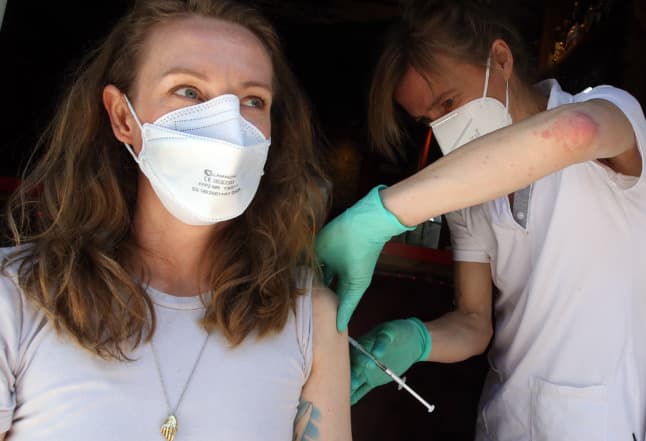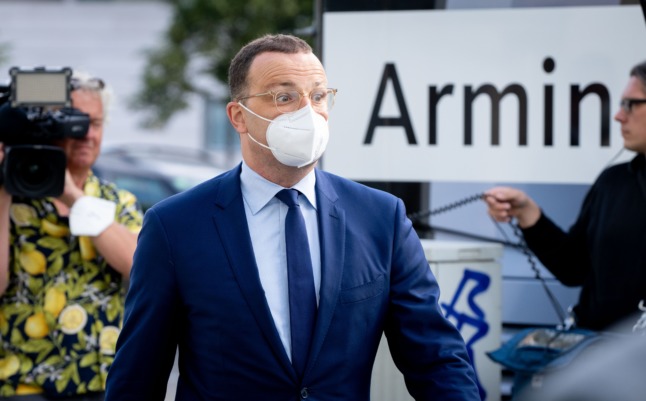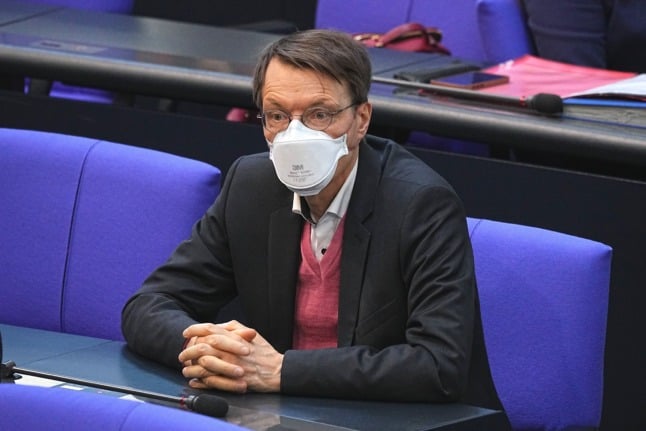Germany considers offering Covid top-up jabs for all

German Health Minister Jens Spahn (CDU) is said to be considering rolling out Covid 'booster' jabs for everyone, following an earlier announcement that vulnerable groups would receive an additional shot.
German states are gradually starting the so-called booster vaccinations in care facilities and for people who are particularly at risk of severe courses of Covid, Spahn told the German Editorial Network (RND) on Thursday.
READ ALSO: Bavaria starts booster Covid jabs for most vulnerable
In addition, those who have so far only received vector vaccines - meaning two shots of AstraZeneca or one shot of Johnson & Johnson - will have the chance to be vaccinated again, this time with either Pfizer or Moderna.
These groups will be able to book their additional vaccine dose from their GP from September, provided at least six months have passed since their last jab.
"As a second step, we can then think about offering a booster vaccination to everyone else as well," Spahn said.
Debate over booster jabs
In a statement on Wednesday, the World Health Organisation (WHO) criticised the wealthier countries who are opting to offer booster jabs to their citizens before sharing their vaccine stock with poorer nations.
"We believe clearly that the data today does not indicate that boosters are needed," WHO chief scientist Soumya Swaminathan said at a Geneva news conference.
READ ALSO: Who’s about to get a top-up Covid shot in Germany – and why?
But Spahn defended the move on Thursday, saying that he believed it was possible to deliver top-up jabs to Germans while also sending doses abroad.
"My goal is both," he told RND. "To ensure booster vaccinations and to donate vaccine to the poorer countries."
He said Germany was already doing the latter, with all outstanding AstraZeneca deliveries going directly to the international vaccine initiative Covax.

Health Minister Jens Spahn has defended his decision to offer booster jabs in autumn, despite the WHO's opposition to the move. Photo: picture alliance/dpa | Kay Nietfeld
Back in July, the Health Ministry announced that it had secured enough vaccine doses to give everyone in the country at least two booster jabs in 2022.
For the roll-out of these booster vaccinations, Spahn said he is relying primarily on doctors' offices.
At the end of September, many vaccination centres will be closed and put on 'standby' mode, with many already shutting over the course of august.
READ ALSO: Here’s where (and why) Covid vaccine centres are due to close in Germany
"But the doctors' surgeries are still there," he added. "They alone can manage up to five million vaccinations a week."
Booster jabs 'make sense' for the vulnerable
Virologist Christian Drosten had said that in his opinion the majority of those vaccinated would not need a booster vaccination against Covd-19 in the autumn.
"The protective effect of the Corona vaccines is much better than, for example, the influenza vaccines," he told DPA.
For the elderly as well as certain high-risk patients, Drosten believes a booster vaccination this autumn makes sense. For the rest of the population, an age level will perhaps be defined at some point, from which a booster vaccination would make sense.
SPD health expert Karl Lauterbach told the Funke Mediengruppe on Friday that 'vaccine breakthrough' infections - where people contract Covid despite being inoculated - tended to occur in people whose last dose of vaccination had been taken more than six months before.
READ ALSO: EXPLAINED: Why vaccinated people in Germany are still getting Covid
This type of 'breakthrough' could occur regardless of the vaccine used, he said.
"With all Corona vaccines, the risk of vaccine breakthrough increases after six months," Lauterbach added. "So we will probably soon see more cases as soon as the vaccination is more than six months old in quite a few vaccinated people in Germany."

SPD health expert Karl Lauterbach has claimed that vaccine protection diminishes after six months, which can lead to 'vaccine breakthrough' infections. Photo: picture alliance/dpa | Michael Kappeler
As a rule, illnesses following Covid vaccine breakthroughs are not as dangerous as illnesses in the unvaccinated, however.
"The probability of having to be treated in hospital is also significantly lower for those who, for example, would have an increased risk of hospitalisation due to their age group without vaccination."
But there are two other serious problems, he said.
"According to a new study, 19 percent of people with vaccine breakthroughs experience long Covid. In addition, those who become infected after a vaccine breakthrough are just as contagious as unvaccinated people, though not for as long."
According to Lauterbach, new studies assume that the effect of the vaccines is substantially prolonged after a third vaccination.
"The protection will not be permanent, but it will still be significantly longer than half a year," he explained.
Comments
See Also
German states are gradually starting the so-called booster vaccinations in care facilities and for people who are particularly at risk of severe courses of Covid, Spahn told the German Editorial Network (RND) on Thursday.
READ ALSO: Bavaria starts booster Covid jabs for most vulnerable
In addition, those who have so far only received vector vaccines - meaning two shots of AstraZeneca or one shot of Johnson & Johnson - will have the chance to be vaccinated again, this time with either Pfizer or Moderna.
These groups will be able to book their additional vaccine dose from their GP from September, provided at least six months have passed since their last jab.
"As a second step, we can then think about offering a booster vaccination to everyone else as well," Spahn said.
Debate over booster jabs
In a statement on Wednesday, the World Health Organisation (WHO) criticised the wealthier countries who are opting to offer booster jabs to their citizens before sharing their vaccine stock with poorer nations.
"We believe clearly that the data today does not indicate that boosters are needed," WHO chief scientist Soumya Swaminathan said at a Geneva news conference.
READ ALSO: Who’s about to get a top-up Covid shot in Germany – and why?
But Spahn defended the move on Thursday, saying that he believed it was possible to deliver top-up jabs to Germans while also sending doses abroad.
"My goal is both," he told RND. "To ensure booster vaccinations and to donate vaccine to the poorer countries."
He said Germany was already doing the latter, with all outstanding AstraZeneca deliveries going directly to the international vaccine initiative Covax.

Health Minister Jens Spahn has defended his decision to offer booster jabs in autumn, despite the WHO's opposition to the move. Photo: picture alliance/dpa | Kay Nietfeld
Back in July, the Health Ministry announced that it had secured enough vaccine doses to give everyone in the country at least two booster jabs in 2022.
For the roll-out of these booster vaccinations, Spahn said he is relying primarily on doctors' offices.
At the end of September, many vaccination centres will be closed and put on 'standby' mode, with many already shutting over the course of august.
READ ALSO: Here’s where (and why) Covid vaccine centres are due to close in Germany
"But the doctors' surgeries are still there," he added. "They alone can manage up to five million vaccinations a week."
Booster jabs 'make sense' for the vulnerable
Virologist Christian Drosten had said that in his opinion the majority of those vaccinated would not need a booster vaccination against Covd-19 in the autumn.
"The protective effect of the Corona vaccines is much better than, for example, the influenza vaccines," he told DPA.
For the elderly as well as certain high-risk patients, Drosten believes a booster vaccination this autumn makes sense. For the rest of the population, an age level will perhaps be defined at some point, from which a booster vaccination would make sense.
SPD health expert Karl Lauterbach told the Funke Mediengruppe on Friday that 'vaccine breakthrough' infections - where people contract Covid despite being inoculated - tended to occur in people whose last dose of vaccination had been taken more than six months before.
READ ALSO: EXPLAINED: Why vaccinated people in Germany are still getting Covid
This type of 'breakthrough' could occur regardless of the vaccine used, he said.
"With all Corona vaccines, the risk of vaccine breakthrough increases after six months," Lauterbach added. "So we will probably soon see more cases as soon as the vaccination is more than six months old in quite a few vaccinated people in Germany."

SPD health expert Karl Lauterbach has claimed that vaccine protection diminishes after six months, which can lead to 'vaccine breakthrough' infections. Photo: picture alliance/dpa | Michael Kappeler
As a rule, illnesses following Covid vaccine breakthroughs are not as dangerous as illnesses in the unvaccinated, however.
"The probability of having to be treated in hospital is also significantly lower for those who, for example, would have an increased risk of hospitalisation due to their age group without vaccination."
But there are two other serious problems, he said.
"According to a new study, 19 percent of people with vaccine breakthroughs experience long Covid. In addition, those who become infected after a vaccine breakthrough are just as contagious as unvaccinated people, though not for as long."
According to Lauterbach, new studies assume that the effect of the vaccines is substantially prolonged after a third vaccination.
"The protection will not be permanent, but it will still be significantly longer than half a year," he explained.
Join the conversation in our comments section below. Share your own views and experience and if you have a question or suggestion for our journalists then email us at [email protected].
Please keep comments civil, constructive and on topic – and make sure to read our terms of use before getting involved.
Please log in here to leave a comment.